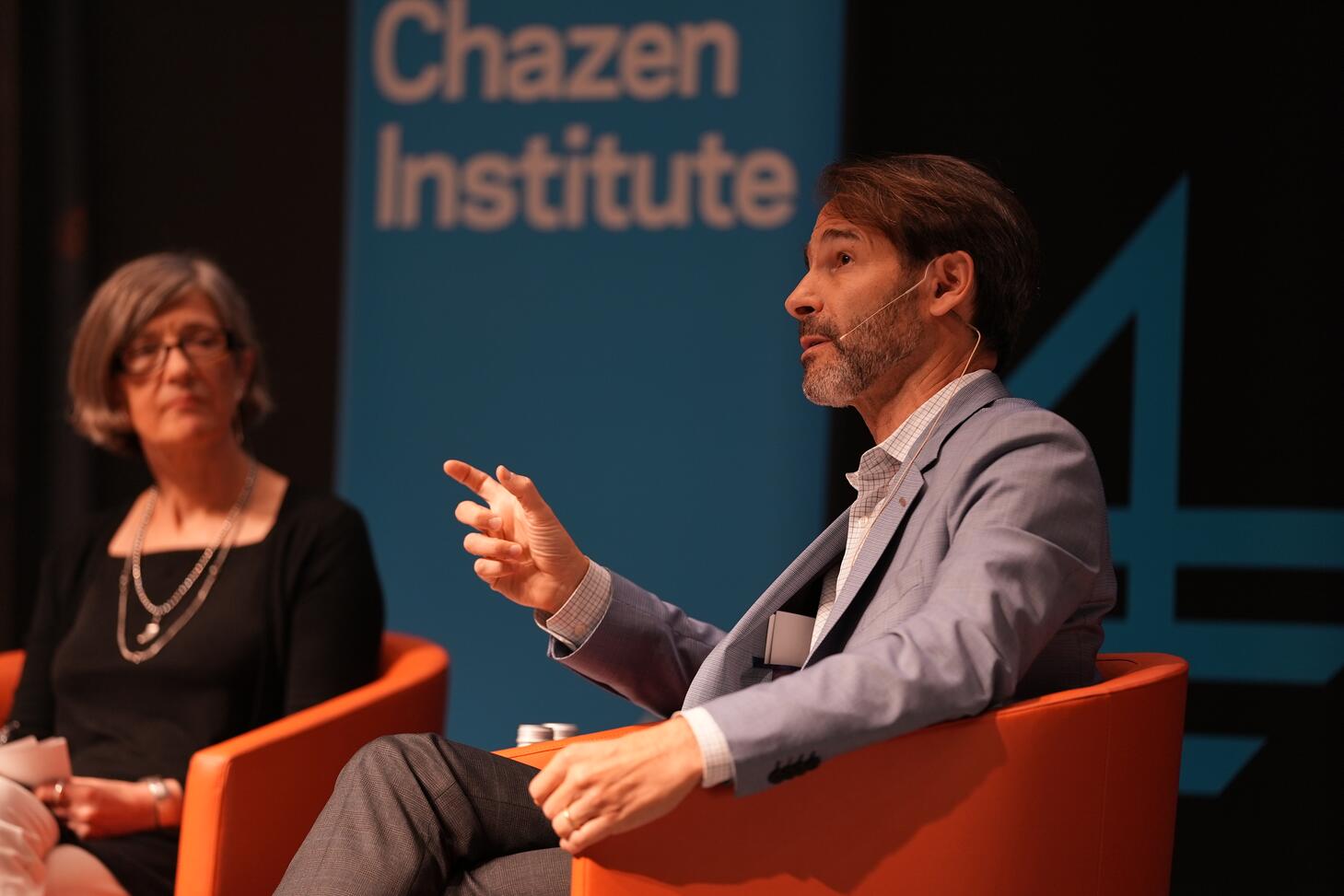UPDATE: This article was originally posted on March 15, 2019. It has been updated with new information and tips below.
With an enduring air of glamor and astronomical paychecks, getting a job on Wall Street is a goal for many MBA applicants.
Yet landing a high-paying finance job is no easy task, especially if you’re planning to switch careers to enter the field. Competition for jobs at top-tier financial institutions is cutthroat, so even small advantages can be the difference between earning a spot at a top firm and failing to break into finance.
One of the greatest advantages you can give yourself when it comes to breaking into finance is to attend an MBA program. Designed to help career-switchers and prestige-seekers alike land their dream jobs, an MBA is a powerful tool you can leverage to reach the next level of career success.
However, if you’re focused on working in the financial markets, not all MBA programs are created equal. Though all MBAs offer a general finance curriculum (such as accounting and corporate finance), certain programs have a much stronger track record when it comes to earning their graduates the most coveted jobs on Wall Street.
That’s why we’ve put together this list of the best MBAs for finance, as well as our best tips and tricks to ensure your dream of working in finance becomes a reality.
Why Attend an MBA to Break into Finance?
Though MBAs are designed to include courses on numerous business-related topics ranging from leadership to innovation, the fact is that certain programs are known for their strengths in certain areas.
For example, MIT Sloan’s long track record of excellence in operations consistently attracts many of our candidates who seek careers in this field. However, for those more interested in entrepreneurship, Stanford GSB, with its vast resources for entrepreneurial learning, might be the better option.
However, finance is one of the most common specializations our clients seek to pursue during their MBA as a gateway to a new career in the industry.
Some would argue that it’s better just to start applying for jobs on the Street and forgo business school altogether, but that could be a big mistake.
According to GMAC, 43% of enrolled MBA students use the program to switch careers, and 89% of graduates who wanted to switch careers state they were satisfied with their investment in the MBA to do so. In order to really stand out as a competitive candidate for a top-tier finance position, an MBA is necessary not only for your CV but to develop your skill set.
That’s because MBA programs offer you a combination of specialized curriculum, outstanding faculty, unparalleled alumni networks to help you make the connections that will open doors for your career, and, importantly, the support of a dedicated career services department whose key objective is landing you a job.
Though there are many programs that offer finance-focused specializations, the ten programs below are the best of the best.
The Top 10 MBAs for Finance
There are multiple rankings for the best finance MBAs, all of which use different metrics. Some focus purely on post-MBA salary, others on the percentage of graduates that go into the field.
The following schools, according to QS’s global rankings, offer the ten best MBAs for applicants seeking a career in finance. We use QS as they have a more global outlook than other more US-focused sources. Their rankings are based mainly on employer reputation and career placement. Our list includes salary and employment information for MBA grads.
The University of Pennsylvania – Wharton School of Business
 Source: @whartonschool on Instagram
Source: @whartonschool on Instagram
Location: Philadelphia, Pennsylvania (United States)
Median Salary: $173,513
% of Students Entering Finance: 38.6%
To see the full picture, check out Wharton’s most recent employment report here.
Often called “the Finance Factory,” Wharton is a powerhouse when it comes to resources for those looking to advance their careers in or transition their careers to the financial services industry. At Wharton, you can pursue a generalist finance path with the Finance Major or can pursue the STEM-certified Quantitative Finance Major if that better matches your career interests. In addition, Wharton offers courses such as “ESG and Impact Investing” and “Energy Finance,” which allow students to explore unique areas of finance.
(To learn how to write outstanding Wharton essays, click here.)
The University of Chicago – Booth School of Business
 Photo courtesy of @chicagobooth on Instagram
Photo courtesy of @chicagobooth on Instagram
Location: Chicago, Illinois (United States)
Median Salary: $175,000
% of Students Entering Finance: 35.1%
To see the full picture, check out Booth’s most recent employment report here.
Famous worldwide for its economics program, Chicago Booth is often top of mind when it comes to finance-focused MBAs. Booth has not one, but two finance concentrations. The first, Finance, takes a more general approach to the topic and includes classes like The Fintech Revolution and Debt, Distress, and Restructuring. Booth also offers an Analytical Finance concentration, which allows students to dig deep into financial theories and their application. Equally as important, Booth is famous for its exceptional number of Nobel Prize-winning professors, including the legend Eugene Fama, often considered the father of modern finance. The cherry on top is Booth’s unique flexible curriculum structure, which allows students to take particular advantage of Booth’s many finance offerings (Booth offers more advanced finance classes than any other business school).
(To learn how to write outstanding Booth essays, click here.)
New York University – Stern School of Business
 Source: @nyustern on Instagram
Source: @nyustern on Instagram
Location: New York City, New York (United States)
Salary: $175,000
% of Students Entering Finance: 36%
To see the full picture, check out Stern’s most recent employment report here.
Located in New York City, Stern is a top choice for many finance-focused professionals. Consistently ranked one of the best finance MBAs, NYU has some of the best finance faculty around, including Professor Robert Engle, the recipient of the 2003 Nobel Prize in Economics. The school also offers a well-structured Finance department that offers a number of specializations that allow students to drill down into incredibly specific aspects of finance. These include banking, economics, finance (general), financial instruments and markets, fintech, qualitative finance, and real estate.
(To learn how to write outstanding NYU Stern essays, click here.)
Columbia Business School
 Source: @columbia_biz on Instagram
Source: @columbia_biz on Instagram
Location: New York City, New York (United States)
Median Salary: $175,000
% of Students Entering Finance: 36.9%
To see the full picture, check out Columbia’s most recent employment report here.
Columbia also regularly tops the charts for finance MBA rankings. Located in New York City, CBS makes sure the city is your classroom, giving students the opportunity to learn in real board rooms through its internship and externship programs. Additionally, seminar series like Finance Free Lunch allow CBS students to gain unprecedented access to leading execs in the finance world. In addition to a core curriculum that provides students with a solid foundational in finance and economics, the school’s Finance Division offers tailored courses for students seeking to focus their careers in areas like asset management; investment banking and corporate finance; sales, trading, and research; and risk management.
To learn how to write outstanding CBS essays, click here.
MIT – Sloan School of Management
 Photo courtesy of @mitsloan on Instagram
Photo courtesy of @mitsloan on Instagram
Location: Cambridge, Massachusetts (United States)
Median Salary: $170,000
% of Students Entering Finance: 22.6%
To see the full picture, check out Sloan’s most recent employment report here.
Though it might not immediately come to mind when you think of finance, the MIT Sloan MBA offers a powerful set of resources for those looking to focus their careers in the financial field. First, the school’s Finance Track offers a wide range of courses that prepare students for finance careers in functions ranging from IB to PE to anything in between. Students can also take advantage of MIT’s experiential learning focus through the Finance Lab and Fintech Ventures program, among others.
(To learn how to write outstanding MIT Sloan essays, click here.)
Stanford Graduate School of Business
 Source: @stanfordgsb on Instagram
Source: @stanfordgsb on Instagram
Location: Stanford, California (United States)
Salary: $175,000
% of Students Entering Finance: 33%
To see the full picture, check out Stanford’s most recent employment report here.
Though Stanford might first come to mind when thinking about tech or entrepreneurship, the school possess a clear prowess in finance. Through Stanford’s Finance area, students can take advantage of a wide range of courses like Entrepreneurial Finance and Private Equity Investing Seminar. Additionally, through the school’s mandatory Global Experiences program, students can put what they learn into practice in the real world. The cherry on top is Stanford’s unique focus on challenging students to expand their mindsets and define the future.
(To learn how to write outstanding Stanford essays, click here.)
Harvard Business School
 Source: @harvardhbs on Instagram
Source: @harvardhbs on Instagram
Location: Cambridge, Massachusetts (United States)
Median Salary: $175,000
% of Students Entering Finance: 33%
To see the full picture, check out Harvard’s most recent employment report on finance here.
Given HBS’ huge student body, it’s no surprise that the school also offers an impressive number of resources to students looking to advance their careers in finance. Within the Finance academic unit, students can take courses like Entrepreneurial Finance and the memorably named How to Not Bankrupt Your Family. For those looking for a more action-based approach to finance learning, HBS offers, through its FIELD program, courses like Private Equity Projects and Ecosystems and HBS Impact Investment Fund.
(To learn how to write an outstanding HBS essay, click here.)
Cornell Johnson
 Source: @cornellmba on Instagram
Source: @cornellmba on Instagram
Location: Ithaca, New York (United States)
Median Salary: $175,00
% of Students Entering Finance: 39%
To see the full picture, check out Cornell’s most recent employment report here.
Cornell packs a finance punch, with 4 unique finance-related areas of focus within its two-year MBA program: Asset Management/Investment Research, Corporate Finance, Investment Banking, and Investment Banking. The school also offers a Sustainable Global Enterprise focus area, with courses like Topics in ESG Investing, so students with ESG-focused goals can benefit tremendously from the program. Cornell also has a strong emphasis on immersion learning and offers finance-focused professionals opportunities to put what they learn into practice through immersions like Corporate Finance, Investment Banking, and Investment Research and Asset Management.
(To learn how to write outstanding Cornell essays, click here.)
London Business School
 Source: @londonbschool on Instagram
Source: @londonbschool on Instagram
Location: United Kingdom
Median Salary: $147,000
% of Students Entering Finance: 27
To see the full picture, check out LBS’s most recent employment report here.
Europe’s premier finance program, LBS has a long and distinguished legacy of placing its graduates at top financial institutions around the world. With a highly flexible curriculum that allows students to focus on the courses they find most relevant for their career paths, LBS offers a wide range of finance electives, ranging from Project and Infrastructure Finance to Hedge Funds. The school also offers numerous experiential learning opportunities, including LondonCAP (which allows students to take advantage of opportunities in London) and Global Business Experiences.
(To learn how to write outstanding LBS essays, click here.)
Oxford Saïd Business School
 Source: @oxfordsbs on Instagram
Source: @oxfordsbs on Instagram
Location: United Kingdom
Median Salary: $104,000 (£87,196)
% of Students Entering Finance: 33.3%
To see the full picture, check out Oxford Said’s most recent employment report here.
Another strong finance-focused program in Europe, Oxford offers an outstanding finance-focused program. In addition to strong core courses, Oxford offers finance electives on numerous topics ranging from Impact Investing to Corporate Valuation. The school also offers a number of international electives, like Fintech: Present and Future: London, which allow students to apply what they learn in a global context.
(To learn how to write outstanding Oxford Said essays, click here.)
Additional Programs to Consider
Though they didn’t make our Top 10 list, there are numerous other excellent MBA programs for finance-focused MBA professionals. In addition to the schools mentioned above, you may want to also take a closer look at The University of Michigan Ross, UCLA Anderson, Duke Fuqua, The University of Texas of Austin, and Dartmouth Tuck. If you’re looking at Europe, EDHEC and SDA Bocconi are also worth a look!
The Importance of Faculty and Curriculum in Finance MBAs
When considering which MBA is best positioned to help you launch your career in finance, it can be tempting to look only at employment information. However, how each school teaches finance, as well as the faculty they have at their disposal, varies greatly and may affect how effectively you can achieve your specific goals.
For example, recently, our client Flávio was looking to transition from a role in corporate finance at a large multinational to a role in impact investment banking.
After discovering Columbia’s Value Investing program, whose curriculum is based on the Warren Buffett approach to allocating capital, he knew he’d found the perfect program for him. Though Chicago Booth, for example, also offers a stellar array of finance and investment professors, its curriculum’s focus on strategy and analytics just didn’t quite fit his interests as well.
 Source: Columbia Business School website
Source: Columbia Business School website
That’s why, before creating your shortlist of target schools, you’ll want to make sure to deep dive into each business school’s curricular specifics to ensure you’ll be able to pursue your specific academic interests at that program.
Shifting your Career to Finance
If you’re planning to use your MBA to break into finance, remember that simply attending a top-ranked school is not enough. You’ve got to work for it.
Though we suggest you capitalize upon all opportunities you encounter during your MBA, the following three are some of the most powerful.
Your Summer Internship is Essential
Though the most important decision you’ll have to make during your MBA process is where to attend, the second most important decision is, without a doubt, where you’ll do your summer internship.
A mainstay of 2-year MBA programs, summer internships not only give you the opportunity to test out whether or not a career in finance is really for you, but they also allow you to make essential connections that will greatly facilitate your ability to land an amazing post-MBA job.
In fact, summer internships are more important than ever, as a larger number of companies that traditionally recruited both first-year and second-year MBA students for full-time employment are now focusing more exclusively on recruiting first-year students.
This also means that more companies are offering internships (a recent GMAC survey indicated that 59% of companies have actively increased the number of MBA summer internships they offer).
As such, if you’re planning to land a job at a top-tier investment bank, you should make sure that, when planning your summer internship, you very carefully target the firms you’d like to receive offers from post-graduation.
Use your Network
One of the most important elements of the MBA is building your network with a global group of high-performing professionals.
Considering the alumni network you build during your MBA will put you in touch with potential employers and/or business partners, the strength of a school’s network will ultimately influence your career.
As such, we suggest you research extensively (via schools’ employment reports) where MBA graduates from your target programs end up working (to ensure you’ll have introductions to the firms you’re most interested in). Additionally, connect with current students and alumni to ask them how helpful a particular school’s network was in landing a job.
Location. Location. Location.
Though the world is increasingly global, where you do your MBA inherently still largely influences which opportunities you will have access to.
For example, let’s imagine you want to break into Private Equity and decide to go to Berkeley Haas. Though Berkeley Haas is a phenomenal MBA program, the headquarters of the firms most MBAs are dying to work for is a 6-hour flight away in New York City.
This doesn’t mean you can’t participate in New York-based recruiting and events, it just means you’re going to have to do a lot more planning ahead.
There’s no one “ideal” place to obtain your MBA, but location will ultimately play a role in your future. As such, it’s important to reflect fully on how this critical factor influences your MBA journey.
Get into a Top Finance MBA
During the MBA application process, you will need to make thousands of decisions that will impact your life for decades to come.
One of the most important decisions is where you choose to apply. If you’re interested specifically in top finance MBAs, you’ll have even tougher decisions to make.
Though you may be tempted just to work your way down the rankings, having a trusted ally who can use their deep knowledge of your profile and what different business schools offer can be the difference between loving your MBA program and wishing you’d done everything differently.
Many of our clients come to us with a general idea of what they want to do with their careers after they complete an MBA but lack specifics. Our career coaches step in at this point to help you define what you want out of your career, create concrete short-term and long-term goals to make sure your transition to finance is as successful as possible, and identify which business schools can best help you turn these dreams into reality.
We are especially proud to offer this service to you, as we find it helps our clients take greater advantage of their MBAs.
Apply to work with us and get accepted into your top choice finance MBA!
Real MBA Essays That Got People In
School-specific sample essays that got our clients accepted






